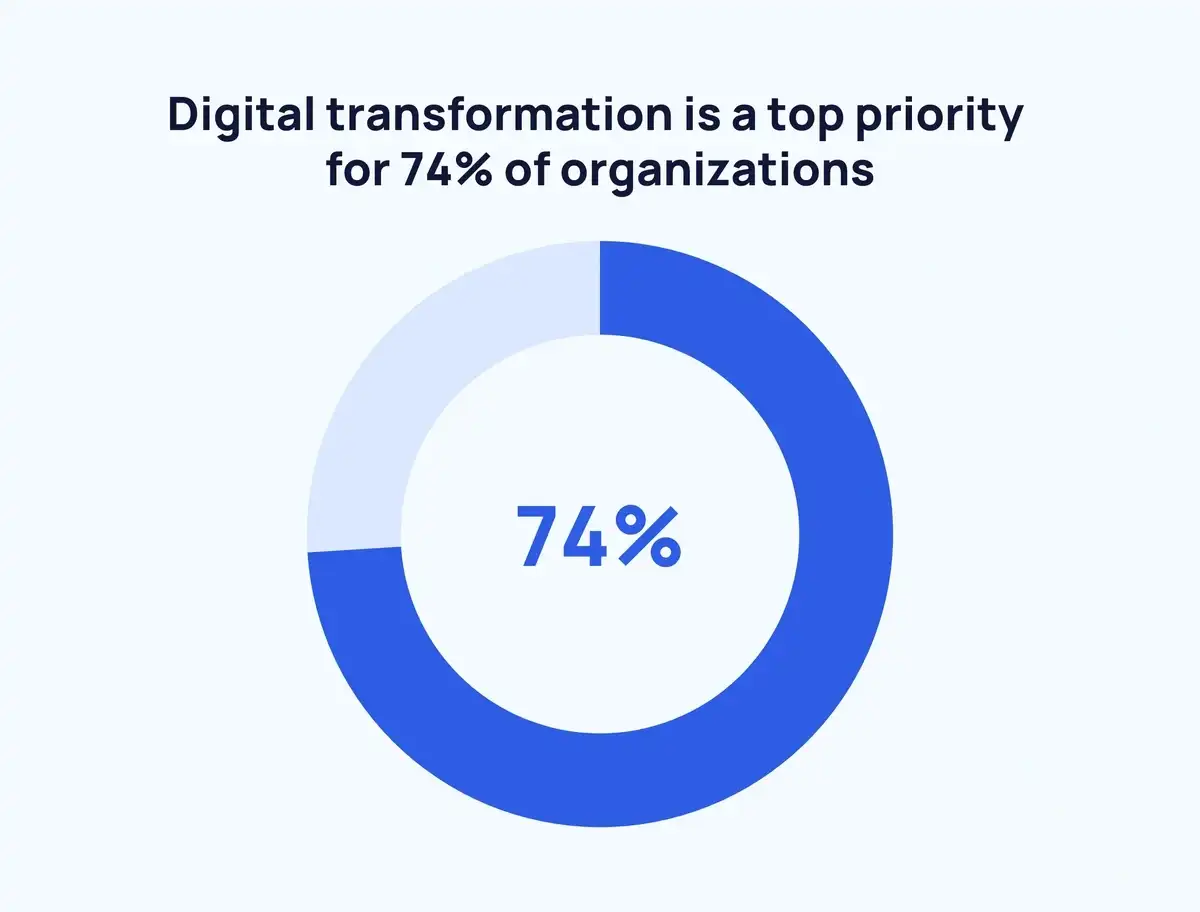Businesses face constant pressure to stay competitive and relevant. Many struggle with outdated systems and processes, unable to meet modern demands.
Digital transformation offers a lifeline, providing the necessary tools to improve efficiency, reduce costs, and enhance customer experience. In fact, 89% of all companies have already adopted a digital-first business strategy or plan to do so.
Without embracing digitalization, companies risk falling behind, losing out on innovation, and failing to meet customer expectations.
As Nahjee Maybin, CEO of Kenyatta Computer Services, says, “Implementing digital transformation strategies can revitalize your business, fostering growth and maintaining a competitive edge.”
In this blog, we’ll explore the top 10 benefits of digital transformation and why it’s crucial for your business’s success.
Discover how leveraging digital tools can transform your operations, streamline processes, and create a more agile and innovative organization. Read on to understand the impact of digital transformation and how it can propel your business forward.
Struggling to Keep Up with Tech Advancements?
Stay ahead with our innovative digital transformation strategies.
Exploring the Benefits of Digital Transformation in Today’s Market
1. Enhanced Customer Experience
One of the primary benefits of digital transformation is the ability to offer a superior customer experience. By leveraging digital tools, businesses can provide personalized interactions and streamline customer service.
For instance, implementing chatbots and AI-driven customer service can significantly reduce response times and improve customer satisfaction. The result is a loyal customer base that enjoys consistent, high-quality interactions with your brand.
2. Improved Efficiency and Productivity
Digital transformation directly impacts your business operations by automating routine tasks and processes. Automation tools like robotic process automation (RPA), and artificial intelligence (AI) can handle repetitive tasks, allowing your team to focus on strategic initiatives.
This shift increases productivity and reduces the likelihood of human error, leading to more reliable outcomes and improved efficiency.
Source: ExplodingTopics
3. Cost Savings
Adopting digital transformation strategies can lead to significant cost savings. By automating processes and optimizing resource allocation, businesses can reduce operational costs.
For example, cloud computing allows companies to scale their IT infrastructure up or down based on demand, eliminating the need for expensive hardware and maintenance. These savings can then be reinvested into other business areas, fostering growth and innovation.
4. Enhanced Data Collection and Analysis
Digital transformation enables businesses to collect vast amounts of data from various sources. This data can be analyzed to gain insights into customer behavior, market trends, and operational performance.
Advanced analytics tools can turn this data into actionable insights, helping businesses make informed decisions. By understanding customer preferences and market dynamics, companies can refine their products and services to meet customer needs better.
| More resources you might like: |
5. Better Collaboration and Communication
Modern digital tools facilitate better collaboration and communication within and outside the organization. Platforms like Microsoft Teams, Slack, and Zoom have revolutionized teamwork, especially in remote work settings.
These tools enable real-time communication, file sharing, and project management, ensuring all team members stay aligned and productive, regardless of their physical location.
6. Increased Agility and Innovation
Digital transformation empowers businesses to be more agile and innovative. With digital tools and technologies, companies can quickly adapt to market changes and customer demands.
For example, agile methodologies in software development allow for rapid iteration and deployment of new features. This agility helps businesses stay competitive and fosters a culture of continuous improvement and innovation.
7. Improved Customer Insights
With digital transformation, businesses can gain deeper insights into customers’ needs and preferences. Advanced data analytics and customer relationship management (CRM) systems allow for collecting and analyzing customer data in real-time.
This information can be used to create personalized marketing campaigns, improve product offerings, and enhance overall customer experience, ultimately leading to increased customer loyalty and retention.
8. Enhanced Security
Digital transformation includes adopting advanced cybersecurity measures to protect business data and operations. With the increasing number of cyber threats, businesses need robust security strategies to safeguard their digital assets.
Implementing technologies such as encryption, multi-factor authentication, and continuous monitoring can help mitigate risks and ensure the integrity and confidentiality of sensitive information.
9. Competitive Advantage
Companies that embrace digital transformation often gain a significant competitive advantage. By leveraging digital technology benefits, businesses can innovate faster, improve efficiency, and respond more quickly to market changes.
This proactive approach allows companies to outperform their competitors and establish themselves as leaders in their industry. Quickly adapting and innovating is crucial in maintaining a competitive edge.
10. Better Decision-Making
The impact of digital transformation on decision-making cannot be overstated. With access to real-time data and advanced analytics, businesses can make informed decisions quickly.
This capability enables leaders to respond to market opportunities and challenges more effectively. By relying on data-driven insights, companies can minimize risks and optimize their business strategies for better outcomes.
Steps to Implement Digital Transformation
| Step | Description | Expected Outcome |
| 1. Assess Current State | Evaluate existing systems, processes, and technologies. | Identify gaps and areas for improvement. |
| 2. Set Clear Goals | Define specific, measurable objectives for digital transformation. | Establish a clear direction and purpose. |
| 3. Develop a Strategy | Create a comprehensive digital transformation strategy. | Outline the roadmap and key initiatives. |
| 4. Secure Leadership Buy-In | Obtain commitment from top management and key stakeholders. | Ensure support and alignment across the organization. |
| 5. Invest in Technology | Select and implement the right digital tools and platforms. | Equip the business with necessary technology. |
| 6. Train Employees | Provide training and development for staff on new technologies. | Enhance skills and ensure smooth adoption. |
| 7. Foster a Digital Culture | Encourage a mindset of innovation and continuous improvement. | Create an environment supportive of digital initiatives. |
| 8. Monitor and Adjust | Continuously track progress and make necessary adjustments. | Ensure the strategy remains effective and relevant. |
| 9. Scale and Optimize | Expand successful initiatives and optimize for efficiency. | Maximize the impact and benefits of digital transformation. |
| 10. Measure Success | Evaluate outcomes against initial goals and KPIs. | Validate success and identify areas for further improvement. |
Transform Your Business with Kenyatta Computer Services’ Expertise
Digital transformation is not just a trend but a necessity for businesses looking to thrive in the modern world.
The benefits of digital transformation are numerous, ranging from improved efficiency and cost savings to enhanced customer experiences and competitive advantage. Embracing digital transformation can lead to significant growth and sustainability for your business.
| Discover Trusted IT Consulting Services in Denver, Colorado |
Kenyatta Computer Services specializes in helping businesses navigate their digital transformation journeys. With a team of experienced professionals, we provide customized solutions that align with your business goals.
Contact us today to schedule a free consultation and start your digital transformation initiative. Let us help you unlock your business’s full potential through digital transformation.



